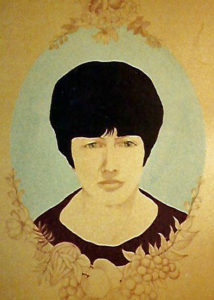Good News…or FAKE GOSPELS?! No classic text is safe from the Trump Effect in Paul Fericano’s satirical verse collection Things That Go Trump in the Night (Poems-for-All/YU News Service, 2019). Famous lines from Elizabeth Barrett Browning, Henry Kissinger, Humphrey Bogart, Bing Crosby, and many others are reworked into zingers that reference the Cheeto-in-Chief and his felonious hangers-on. Individually, the poems and squibs are good for a chuckle or a mood-lifter when the news gets you down. Taken as a whole, the numbing repetition of “Trump” starts to feel like a warning: dictators want all culture to be flattened into their own image. Most substantial, and chilling, is the book’s closing poem, which weaves together fragments of actual Trump speeches with invented absurdities, shining a relentless light on the combination of naïveté and paranoia that makes him so dangerous.
Paul has kindly permitted me to reprint an excerpt below. For more work by this prolific author, check out his bio at Poets & Writers and his online journal Poetry Hotel.
THE NRA REMINDS YOU TO DEFEND THE SECOND AMENDMENT
1. Treat every loaded trump as if it were empty.
2. Always point your trump at anyone
you plan to intimidate.
3. Keep your trump cocked and ready
for any crisis you create.
4. Sleep with your trump at all times.
5. Trumps don’t kill. People do.
****
SAINT PAUL STUMPS FOR TRUMP
BEFORE BEING STONED BY THE CORINTHIANS
1 What if he could not speak
in salty tongues of fast food beef,
and diet drinks or pork chops on a stick?
And what of his illegal rapists
for whom there is no dreaming?
2 If he could not praise himself,
be nothing more than a chimney sweep
or the smoking gun at the bottom
of his father’s safe deposit box.
3 Veracity is an empty cell in his brain,
for all he says is true in his name.
He sets his watch to howdy doody time
where dossiers and liars
are watergate under the bridge.
4 For he is never too proud or boastful
to consort with leakers and colluders.
And if he cavorts with concubines
who relieve themselves on hotel beds,
his complicity is the grey wool of old goats.
5 What if he could reinvent his words
and reshape all reality?
What if he could do these things
while his people are encouraged
to gaze elsewhere?
Look at the grouse! Look at the grouse!
6 And what if he could wear bows
and push buttons that would decimate nations?
Would he not still be revered?
Would he not still be adored?
The pellet with the poison’s in the flagon
with the dragon, and the vessel with the pestle
has the brew that is true.
7 For it is written in the law of Supposes,
You shall not muzzle the mouth of the sham
that spills forth its corn,
lest you become all that and a bag of chips,
or as a toilet that runs all night.
8 And if he is obstructive, inflated,
paranoid and suspicious,
These faults are surely exalted in your eyes.
9 Verily, I say unto you
that all who consume with him
shall ensure a sizeable profit justly returned.
For I am he, as you are he, as you are me
and we are all together.
10 Yea, though his fingers be like long ties,
You know not what he is up to.
11 And denial shall be his greatest pleasure.
For the hoax perpetrated in bad faith
is more than payment due.
12 Be not disturbed by troubled times.
They are as common as the normal spin
of outrageous rent hikes.
For soon the shore of certainty will vanish
and strange odors will fill your nostrils.
13 When he was a president,
he thought not as a president
and reasoned not as presidents do.
But when he grew a tail
and fumbled and groped many girly bits,
and they let him do it,
he embraced his presidential ways.
14 Now he wears the blackface of his birthright.
And faith in desperation kneels
where once it stood defiant in his name:
Mueller, Mueller
why has thou forsaken him?
15 Later, he shall envision a darker stain
and wear the mask
of batmen, beetroots and bucketheads.
16 He spends no time swinging a club,
spray painting his skin or sleeping in a tree.
FAKE GOSPELS!
17 Yea, verily, yea.
Chaos, confusion and catastrophe
shall mark each tweet with impunity.
But of these three,
the greatest of these is Muhammad Ali.
